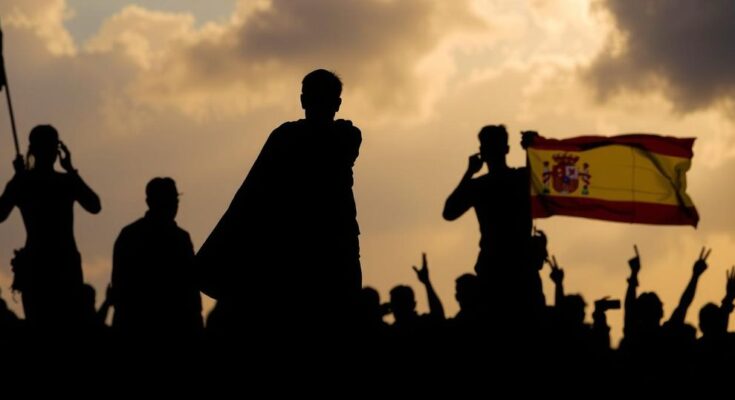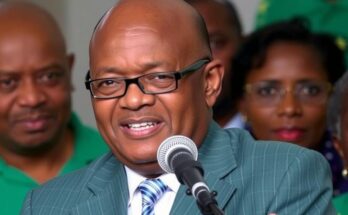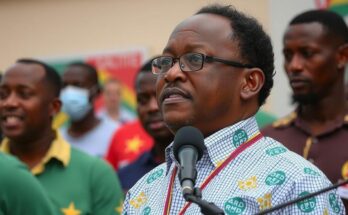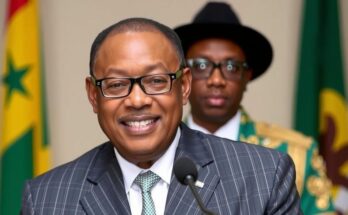At the UN assembly, Brazilian President Lula and Spanish PM Sánchez grappled with criticism for their ties to Nicolás Maduro amidst Venezuela’s political crisis. They organized a pro-democracy event, yet failed to address the ongoing repression in Venezuela, drawing rebuke from other leaders like Chile’s Boric. Questions arose over their diplomatic strategies and complicity regarding Maduro’s regime as public scrutiny mounts against their policies.
During the recent United Nations assembly, Brazilian President Luiz Inácio Lula da Silva and Spanish Prime Minister Pedro Sánchez, two long-time allies of Nicolás Maduro, have faced scrutiny for their perceived complicity with the Venezuelan leader amidst a repressive political environment in Venezuela. The notable occasion, which aimed at promoting democratic ideals and countering far-right movements, seemed overshadowed by the ongoing crisis in Venezuela following Maduro’s controversial election victory last July. Despite the evident turmoil, neither Lula nor Sánchez addressed the Venezuelan situation directly, leading to criticism from Chilean President Gabriel Boric. Boric emphasized that human rights violations should not be assessed based on ideological alignment, naming Maduro alongside controversial leaders such as Israel’s Benjamin Netanyahu and Nicaragua’s Daniel Ortega. His assertion underscored a call for global leaders to prioritize democratic ideals over political affiliations. Lula has historically maintained a close rapport with Maduro, often advocating for diplomatic resolutions to the Venezuelan crisis and criticizing U.S. sanctions. However, this perspective is increasingly viewed as problematic. Critics argue that Lula’s fondness for Maduro clouds Brazil’s foreign policy, particularly as the Venezuelan opposition has struggled to unify against the regime’s repression. Sánchez has encountered mounting pressure following Spain’s recent asylum deal that allowed opposition figure Edmundo González Urrutia to escape, which some perceive as tacit support for Maduro’s regime. The Spanish Prime Minister is also under fire for allowing Maduro-aligned officials to negotiate under sensitive circumstances, raising ethical concerns about Spain’s engagement with the Venezuelan state, especially after revealing González Urrutia felt compelled to accept Maduro’s electoral legitimacy. Moreover, both leaders appear to be attempting to divert attention from the Venezuelan crisis by pivoting discussions toward global threats posed by rising far-right populism, such as a potential Donald Trump presidency. This strategy reflects their commitment to combating misinformation and preserving democratic institutions, as articulated by Brazilian Foreign Ministry officials at the UN assembly. As global leaders gathered to address pressing issues, including misinformation on social media, Lula recommended that nations not be cowed by influential entities that operate above the law. The dichotomy between addressing domestic political challenges and engaging responsibly with international human rights issues remains a balancing act for both Lula and Sánchez. They now navigate an environment fraught with speculation regarding their allegiance to democratic values, particularly as public sentiment concerning their involvement in Venezuela intensifies.
This article discusses the increasing criticism faced by Brazilian President Luiz Inácio Lula da Silva and Spanish Prime Minister Pedro Sánchez due to their longstanding alliances with Nicolás Maduro amid Venezuela’s ongoing political tumult. Maduro’s performance in the recent elections has triggered allegations of electoral fraud and human rights violations, leading to heightened scrutiny of Lula and Sánchez’s failure to directly confront these issues during a pro-democracy event they organized. As various leaders address their concerns regarding the global rise of populism, the dichotomy between human rights advocacy and political alliances complicates their positions.
The gathering at the UN showcased the complex interplay between international diplomacy and national politics, especially regarding the Venezuelan crisis. Presidents Lula and Sánchez face significant challenges as they seek to balance their long-standing relationships with Maduro while addressing the urgent need for democracy and human rights in Venezuela. Their strategies to focus on combating far-right movements may not fully alleviate the scrutiny over their complicity and the implications of their diplomatic choices regarding the future of Venezuelan politics.
Original Source: www.batimes.com.ar




